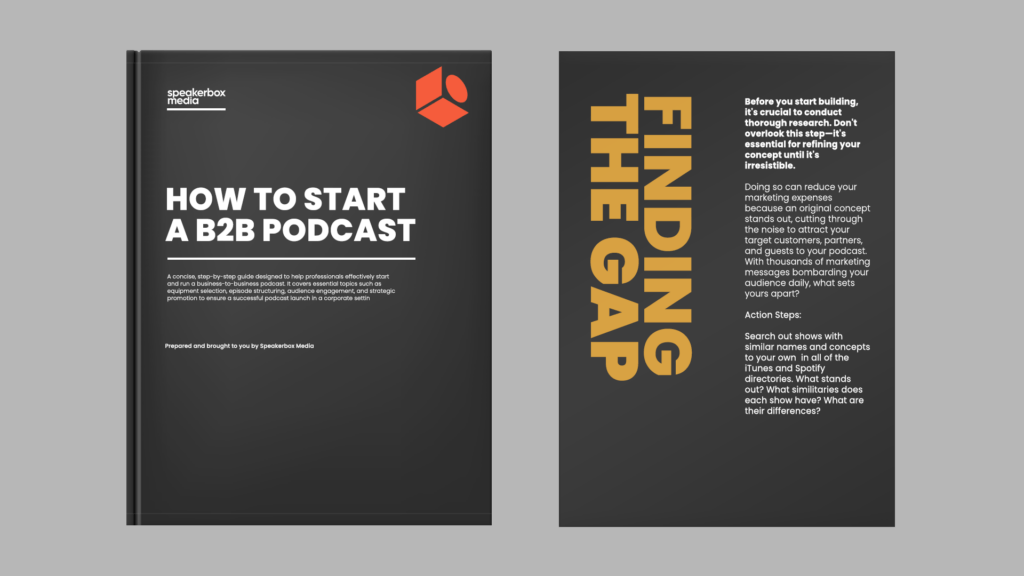How To Approach B2B Podcasting
You’ve probably heard a lot about how podcasts’ popularity is booming and how podcasts will become a necessity in content marketing. It’s true; the share of Americans who listen to podcasts regularly is increasing, and podcasts listeners tend to be wealthy, educated, and occupy mid-senior leadership positions in their companies. Podcasts are ideal for busy professionals looking to stay informed without interrupting their schedules. Consumers can listen to them in the car, while they cook, or while they carry out any number of activities that require visual attention. Podcasts have been described as “talk radio, on-demand.” This distinction is what makes the medium so powerful. Consumers don’t need to worry about tuning in at a specific time or missing parts of the show. Podcasts are pre-recorded and available for downloading or streaming at any time.
While podcasts are relatively easy and inexpensive to produce, a successful B2B one will require a solid strategy and careful planning. B2B content is generally held to a higher standard than B2C content, and the reason is all in the name. B2B audiences are mid-senior level decision-makers in their organizations, and they are looking for information to help them make the best possible decisions. Whether they are looking to purchase software, hardware, or services, they need reliable quantitative data that can help propel their businesses and operations to the next level.
/rays-website-3454/jukka-aalho-_t9c-kmMjl8-unsplash-pde48.jpg)
The primary goals of any content marketing strategy are:
- Build your brand awareness
- Generate leads
- Advertise your products and services
- Increase your brand’s community.
You will need to maintain the same level of diligence (or higher) when creating B2B podcasts as you do when developing any other content. The format of your show may vary depending on whether or not your company is new to the industry or if you’re an industry veteran. When you’re a newbie, your primary goal should be developing industry credibility. If your company is an industry veteran, your podcast should focus on discussing macro trends and providing thought leadership.
Building Credibility
Interview-style podcasts are a great way from new B2B companies to carve out their niche and build their credibility in the industry. When designing a podcast to build authority in a particular sector, you will need to host two kinds of guests:
- Established industry experts
- Your target customers
- Established Industry Leaders
Let’s break this down a bit further. Getting your first ‘big-name’ guest will be critical to positioning yourself as a thought leader in the industry. By hosting a well-known executive or entrepreneur on your podcast, you’re indicating to consumers that the people who they trust also trust you. Later in this blog, we’ll talk about how to score top guests when you’re relatively unknown in the industry.
Target Customers
/rays-website-3454/convertkit-9i3-OAIUHdY-unsplash-b6fb7.jpg)
Once you’ve established your buyer personas, you’ll want to start inviting people who fit the personas on to your show. This will show listeners that you’re in-tune with their business needs on a practical level. By inviting your target customers onto your show, you can show off your expertise and build valuable industry relationships that could convert to sales or referrals.
Your target customer should possess the following characteristics:
- A significant need that can be met by using your products or services.
- The means to pay for your products or services
- A significant knowledge-gap that your podcast can help them bridge.
Expand Your Reach
If your company is already a ‘top-dog’, a podcast can still be a great marketing tool for you. Just ask Dell, Samsung, Salesforce, or any of the numerous tech giants that have started podcasts. As an industry leader, you can give your customers more value by giving a “Top of The Market” perspective. This type of podcast would cover industry trends and developments, and feature only thought leaders in that particular industry. In this kind of podcast, featuring high-profile guests is also a priority.
/rays-website-3454/pexels-chelsey-horne-4499737-dc5ad.jpg)
How To Do It
Get Industry Executives On To Your Show
Regardless of your objectives for your podcast, the first order of business should be securing the highest caliber guests that you can. Aim for executives at companies dominating your market or startups disrupting it. There are several ways to meet the quality of the guests you want. You can start cold-emailing, attending conferences, or join social media groups dedicated to your niche.
If you’re a growing business looking to establish your credibility, getting top industry players to come on your podcast could be tough. You might want to start with local leaders and business owners. As your podcast listener base grows and your relationships with industry leaders expand, you might find it easier to reach for executives at higher levels.
Set Up a Pre-Interview Meeting
This meeting is critical to getting to know your guests and for them to get to know you. From this meeting, you can determine what topics should be discussed on your show and what topics should be avoided. In this meeting, you will make your value proposition and convince them that your show will enhance their brand, not detract from it.
Craft a High-Quality Show
The best guests in the world won’t save you if your show hasn’t been planned out properly. Outlining and rehearsing your show’s structure is crucial if you want to project competence and confidence in your chosen niche. This means determining a theme, refining your script, asking thoughtful questions about your guests’ latest projects, and extracting actionable advice for listeners from the guest. You might even want to structure your podcasts in series so you can tackle specific topics in-depth over several weeks. A poorly executed podcast can damage your industry reputation and deter consumers rather than attract them.
Keep Your Guests Informed Throughout The Process
Be sure to take care of your guests throughout the interview. Some executives embrace their role as spokespersons for the organizations. Others are a bit more shy and nervous about public speaking. Cater your interview style to the interviewees comfort level and keep them informed as the show progresses.
Use Your Podcast As A Focal Point For Weekly Discussions
Struggling to generate social media content? Launching a podcast could help you overcome that block. Podcasts serve as excellent “pillar pieces” for weekly discussions on Instagram, Twitter, TikTok, or Facebook. From a weekly 30-minute podcast, you can generate copious quantities of micro-content like sound bites, quotes, and discussion points. By posting elements of your podcast in small chunks on social media, you can keep your audience engaged long after the podcast has ended and project a cohesive content strategy each week.
Traditionally, long-form blogs and articles have been the primary “pillar pieces” for content marketers. However, as we discussed earlier, podcasts have several advantages over written or video content. Customers can listen to podcasts while they drive or complete other daily tasks. This is also ideal for visually-impaired customers. If you really want to publish a piece of long-form written content, you can also publish a transcript of the show on your website.
Get Your Podcast Out There
An amazing podcast is useless to you if your customers can’t find it. Make sure to publish your podcast on all the major streaming platforms: Spotify, Google Play, iTunes, Soundcloud. Also, make sure that your podcast is easily accessible from your company’s website and social media profiles.
Follow Up With Guests
If you’re serious about building a name for yourself in your industry, nurturing professional relationships will be an ongoing process. Don’t fall out of touch with your guests once the recording stops. Send follow-emails periodically and invite them to meet up in-person occasionally so you can stay up-to-date on industry developments and projects.
What Should You Talk About?
We’ve gone over some of the basics of B2B podcasting but you’re probably still wondering, “what should I talk about?” This can be tricky for anyone new to podcasts or content marketing in general. In any given industry, the potential discussion topics are almost endless. Here are some ideas for getting started:
Getting Started
If you’re a relatively new business, consumers might like to hear about your journey to success. You can talk about how your business got started, the wins and failures you’ve had along the way, or most valuable learning experiences. In a format like this, interviewing the specialists within your company who successfully navigated particular challenges is a great way to give listeners high-quality information that they can apply to their own problems.
State of The Industry
Podcasts are great forums for keeping your customers abreast of industry news. Whether its a new product, software, regulation, or conference, you can position your podcast as the place for people to learn all about what’s new in the industry. For a podcast like this, you will need to stay informed industry news and try to entice industry leaders to come on your show to discuss current affairs.
Looking Ahead
You can also use a B2B podcast to discuss your predictions for the future of the industry. These kinds of discussion topics are great for engaging the audience in social media conversations and learning about other developments in the sector. Developing a new product? This kind of podcast can also be great direct advertising. You can keep your audience informed about your latest projects and use the podcast to announce product releases.
Educational
Learned a few hard lessons along the way? A podcast could be a great way to disseminate information and informal training to listeners. Being transparent about your own mistakes and teaching your audience strategies for avoiding the same mistakes can help you build trust within your listener community.
Speakerbox Media
Speakerbox Media was created out of a passion for engaging and effective communication. We combine our passion for communication with our dedication to helping our customers grow their businesses through superb content marketing. We recognize that not everyone is an audio engineer, and they shouldn’t have to be. Our team will take your raw audio content and refine it into a product that can captivate and delight your target audience. Contact us today for your free consultation and to get started with your trial podcast episode.



/rays-website-3454/GettyImages-944244042-5bc8cc2446e0fb00513b4471-mbf78.jpg)






